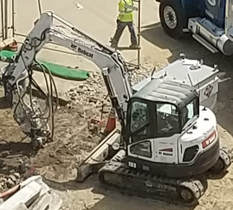weekly column
|
Each week, find a commentary on something connected to verses of Torah or another source of wisdom
|
|
Each week, find a commentary on something connected to verses of Torah or another source of wisdom
|
 The Leviticus:8 Project and lay his hand upon the head of his offering. It shall be slaughtered before the Tent of Meeting, and Aaron’s sons shall dash its blood against all sides of the altar. Leviticus 3:8 I work in an office with a floor-to-ceiling window that, at the moment, overlooks a construction site. (I post many pictures of it on Facebook, if you are interested.) Among the machines that are there solely to distract me is a giant version of an immersion blender. Its purpose is to churn the ground in preparation for the excavator to scoop up the dirt, which is then trucked away. Inevitably (so far), the blender hits water and the hole it is digging fills with mud. When the operator pulls it out, it is caked to the point of dysfunction, and two guys dressed in rubber aprons hose it down until it is once again gleaming white. This is one of the jobs the ten-year-old inner child in me wishes he had. Construction is dirty business. That seems self-evident as I type it, but all my childhood memories of books like Mike Mulligan and his Steam Shovel and toys with Tonka stenciled in stylized letters never prompted the question, “How do you keep this stuff clean?” The blender is pristine at the end of each day, having been sprayed clean any number of times. But someone has to clean up all that mud. Bill Cosby (if it is permissible to use his early work) put such words in the mouth of Noah. “Have you looked in the bottom of that ark?” he screams at “the Lord.” “Who’s gonna clean up that mess?” It is a one-time dilemma in the story – the giant ship rests atop Mt. Ararat awaiting discovery by contemporary adventurers and authors of speculative best-sellers. I am thinking about these messes because of the focus on the biblical verse. Not for the first time and far from the only time the blood of various sacrifices is dashed all around the altar and, presumably, everything and everyone in splattering distance. Who cleans up all that blood? There is a quaint teaching in the Talmud that suggests that a number of miracles were the norm in the Tabernacle and the Temple – no flies in the slaughterhouse, the meat never spoiled, the rain never extinguished the fire, and so on. But it says nothing about the disposition of what was, unquestionably, lot and lots of blood and other liquids that ran from the various offerings. Holiness is a very messy business. I work nine blocks from the White House and about two miles from Capitol Hill. It has always been the case, but no time more than the last two years, that the workings of our government – the constructing of policy, the transporting of legislation from bill to law, the bloodletting of political rhetoric – leave an awful mess. We the people are usually presented with something shined and unsullied as the result, but the process of doing the necessary work of government involves necessary dirty work. Governing is a very messy business. Is it in some measure a blessing that we have been subjected to the specter of mess-making by the current crop of electeds, appointeds and candidates? No matter what you think of the outcome, the detritus of what has been dug, dumped and dashed has revealed in technicolor what we have previously decided to overlook. Our fascination with constructing the edifices of our society, of rescuing ourselves from catastrophe and of making ourselves feel righteous must be cleaned up. Who’s gonna do it? I am pretty sure that the answer is we the people. The combination of bombast and bigotry that has forced us to choose between outcome and process has left its field of debris between us as we rushed to either side. If we are to reclaim the middle space, then it is time to put on the rubber aprons and pick up the hoses and start washing away what has accumulated. We need to sweep away the disparaging nicknames and vulgarities and bald-faced lies. We need to scrub the exaggerated criticisms and disrespect for the office and mockery of frantic and frustrated people trying to do their jobs. That’s not to say we should accept the mess as inevitable and unavoidable. Just as the animal sacrifices evolved into the much more hygienic practice of prayer and the construction lot will become a spotless office building, we have the ability to expect more and elect more. We can lift disagreement above mutually assured destruction, or, as my friend Greg Weiner described the approach of James Madison, embrace persuasion, openness to persuasion, empathy and reasonableness. By late afternoon, a peculiar peace settles over the construction site. The workers have locked the gates. The machines are clean and quiet. The holes are a little deeper and the materials for tomorrow’s work are organized outside the field of activity. Tomorrow will inevitably be a mess – but only a necessary mess. In the end, because someone cleaned up today, it is possible to imagine just a little bit more progress tomorrow.
0 Comments
Leave a Reply. |
Archives
October 2023
Categories |